03 Dec 2018 - {{hitsCtrl.values.hits}}
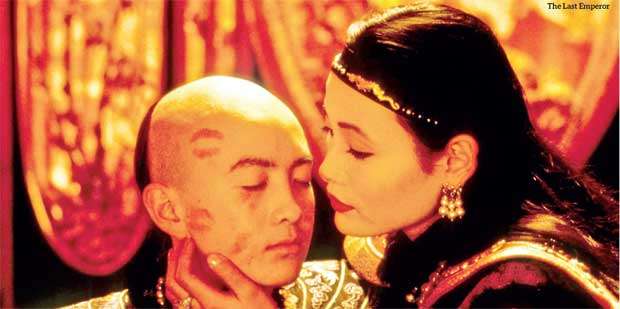
 s we grew up movie-mad, there were those directors, who held us in awe – Orson Welles, David Lean, Akira Kurosawa, Sathyajith Ray, Vittorio de Sica, Andrej Wajda, Alain Resnais, Francois Truffaut, Norman Jewison, Sergei Eisenstein, Sergio Leone and more.
s we grew up movie-mad, there were those directors, who held us in awe – Orson Welles, David Lean, Akira Kurosawa, Sathyajith Ray, Vittorio de Sica, Andrej Wajda, Alain Resnais, Francois Truffaut, Norman Jewison, Sergei Eisenstein, Sergio Leone and more.
This list is both low and high brow, and incomplete. Bernardo Bertolucci (high-brow) came late into the list and worked his way effortlessly to the top even though I’ve seen only three of his films to date – the Little Buddha, The Last Emperor, and Last Tango in Paris.
Of these three, Little Buddha is not regarded highly by critics. It is an elegiac tribute to the life of the Buddha, not a soul-searching cinematic journey like Conrad Rooks’ film Siddhartha, based on Herman Hesse’s novel.
It was a sentimental exploration of a search for personal liberation through Indian philosophy and spirituality, and a startling departure from the strong political stances that Bertolucci’s other films took, which may be why it fell short of critical expectations. 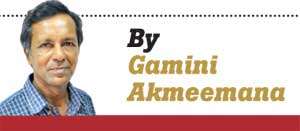
After the shock of Bertolucci’s death at 77 from cancer (He was one of those who seemed eternally young), it is time to look for those films I have missed.
Among Europe’s elite filmmakers, he was unique in breaking through to Hollywood and making films without losing his artistic integrity. The Last Emperor (1987) was his breakthrough movie. It won nine Oscars and confirmed his ability to make epics in the style of David Lean.
Bertolucci was born in Parma in 1941. His father, a poet and teacher, was a friend of filmmaker Pier Pasolini, who gave the young Bertolucci his break into Italian cinema. After working with Sergio Leone on his epic Western Once Upon A Time in the West, Bertolucci got his big break directing the 1970 movie The Conformist in which Jean-Louis Trintignant acts the role of a young gay man who joins the fascists.
The movie reflected Bertolucci’s radical Left-wing politics. “I live in a kind of dream of Communism,” he once said.
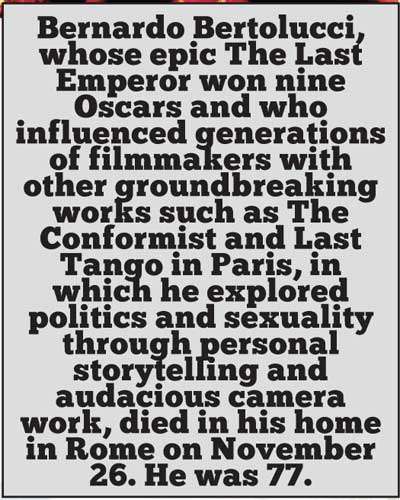 But he became disillusioned with politics as he grew older and did not even vote in the latter stages of his life. He was criticised for working for former premier Silvio Berlusconi’s film company Medusa Film. Bertolucci was openly contemptuous of the politician’s wild lifestyle and political corruption. But Berlusconi never interfered with the director’s work and gave him a free hand.
But he became disillusioned with politics as he grew older and did not even vote in the latter stages of his life. He was criticised for working for former premier Silvio Berlusconi’s film company Medusa Film. Bertolucci was openly contemptuous of the politician’s wild lifestyle and political corruption. But Berlusconi never interfered with the director’s work and gave him a free hand.
“After many, many years, I fell out of love with politics. It’s not something I like but it’s the truth.” Bertolucci told an interviewer during the last year of his life.
The Last Emperor was impressive, but it was the Last Tango in Paris (1972) which made the deepest impression on me. It stars Marlon Brando and Maria Schneider (A 19-year-old French actress making her debut) and the story’s about a casual encounter between the two in Paris which develops into a series of sexual encounters.
The film was a revelation in many ways. Filmed by Bertolucci’s cinematographer Vittorio Storaro in a very seductive style (the effect is enhanced by the saxophone drenched soundtrack and great theme music by jazz composer Gato Barbieri) this film displaced a number of complacent assumptions in my mind about filmmaking, acting and sexuality (both in film and out of it) which haven’t been answered to this day.
Brando (A middle-aged American hotelier called Paul) and Schneider (Jeanne) meet casually and Paul insists from the start that they remain anonymous throughout the relationship. But this emotional distance becomes impossible to maintain. He is rough, even brutal, in his approach. This was a culture shock. Sex, like food or language, is cultural.
The shock of what Brando and Schneider carried out on screen looked to me like a clash of civilizations – his and hers. From my own perspective, violence against women in love and marriage is something we come across as domestic violence.
But this was nothing like it, and she suffers it willingly before finally breaking away. Brando finally admits to loving her (I’m in love with you, you dummy) but by then it’s too late.
The film outraged some critics for its depiction of sex and was blacklisted in festivals when a video released much later revealed that the full details of a key scene of a sexual encounter between Brando and Schneider had not been revealed to her by the director (The scene has been re-instated since).
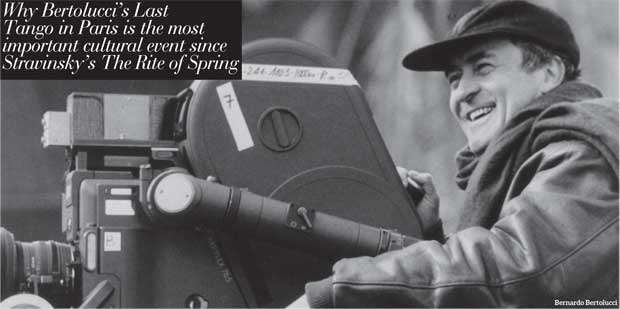
It has been suggested that the role may have damaged Schneider’s subsequent career. But Bertolucci remained unrepentant. After Schneider’s premature death in 2011, he told an interviewer:
“Poor Maria. I didn’t have the occasion to go to ask her to forgive me. She was a 19-year-old who, like the actors in Me and You, had never acted before. Maybe, sometimes in the movie, I didn’t tell her what was going on because I knew her acting would be better. So, when we shot this scene with Marlon [Brando] using butter on her, I decided not to tell her. I wanted a reaction of frustration and rage.”
American film critic Pauline Kael said that Last Tango was the most important cultural event since Stravinsky’s The Rite of Spring. It defined the cultural battle lines between the reactionary Right and the progressive Left in the West.
Bertolucci’s post-Last Tango fame made it possible to shoot his next epic, 1,900 (Filmed in 1976) with big stars such as Robert De Niro, Gerard Depardieu and Burt Lancaster.
His last film was Me and You, based on a novel by Niccolo Ammaniti. He has been married since 1978 to filmmaker Clare Peploe, and the couple had no children.
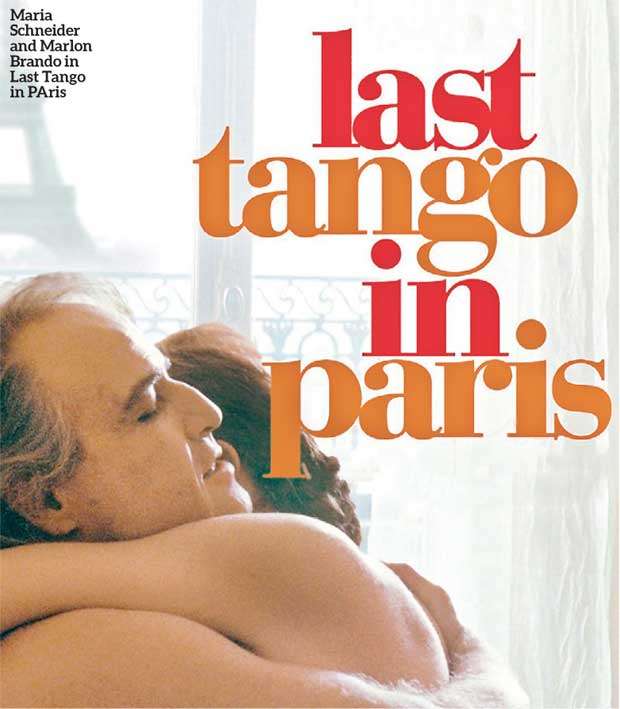
30 Nov 2024 2 hours ago
30 Nov 2024 5 hours ago
30 Nov 2024 6 hours ago
30 Nov 2024 9 hours ago
30 Nov 2024 30 Nov 2024